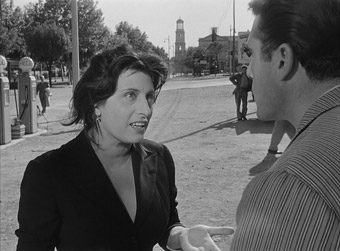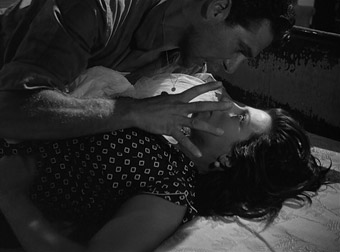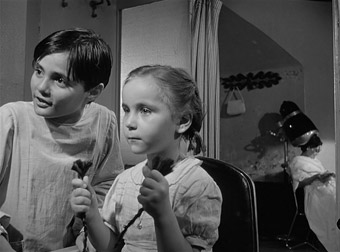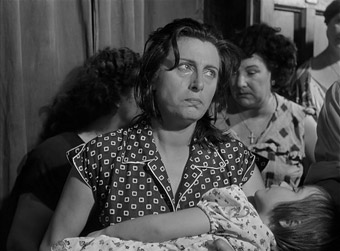|
Anna Magnani was an actress I was aware of long before I actually saw her on screen. As a young boy still discovering the joys of cinema through the dominant output of Hollywood, I was starting to read about films that were never going to turn up at the local Odeon and were unlikely to get a TV airing, in books with arresting pictures of unfamiliar faces and films whose titles were in languages I did not speak. I knew my actors and actresses back then and had my favourites, those whose very presence in a film was enough to assure my attendance. But what of the actors in the pages of these film books, some of whom were being described in the same star-spangled language as biggest names in Hollywood? I knew almost none of them, and even at that young age I felt that I should. There was one face in particular that I, as an adolescent still given to daydreams populated by famous faces, was fascinated by, a fiery but earthy Italian beauty whose talent and work was being described in superlatives. This was my introduction to Anna Magnani.

Like many young film fans, I frequently mistook star quality for real acting ability, though was in the process of discovering the difference and realising that it was perfectly possible for one person to have both. Fine actors could, through good fortune and the right role, become stars, and nice though being a star must be, what they really wanted to do was act. Nowadays, it is often the case that faces become stars, then when they're rich and famous enough they go hunting for that role that will prove they also have acting chops. Anna Magnani belonged to the old school, a great actress who became a star precisely because she was a great actress. Yes, she had the looks, but take a trip to Italy and you'll see strong featured women wherever you go. You needed0 more than a pretty face to become a star of this magnitude in Italian cinema.
It is to my shame that even all these years later I've seen so few of Magnani's films. Access to them used to be a matter of chance – you had to be in London on the right day or up late at night when one was shoehorned into the midnight slot on BBC2. At film school we got to see Roberto Rossellini's 1945 Rome, Open City [Roma, città aperta] – and I can't think of a better introduction to Magnani's considerable skills – while The Rose Tattoo (1955), which won Magnani an Oscar, occasionally turned up for the simple reason that it was made in Hollywood and in the English language (the play was actually written by Tennessee Williams specifically for Magnani, but her English was not strong enough to play the role on Broadway at this point in her career).
Luchino Viscont's 1951 Bellissima remained one of many films I was able to read about but not see, and as with many such titles it got stored in the back of my head for later retrieval should I stumble across it in TV schedules or independent cinema listings. It was in good company – there are many, many films still sitting there waiting for their trigger. Bellissima's came only recently with the news that Masters of Cinema were to release it on DVD. So long has it been since I first filed it away that on receiving the press release I remember saying to myself, "I'm sure I know that title..."
In Bellissima, which translates as "beautiful," Magnani plays working class mother Maddalena, a hired-by-the-injection nurse whose husband Spartaco works as a labourer. They live a sometimes tempestuous life in a council house with their young daughter Maria, and are struggling to make the monthly rent payments. When the news breaks that renowned film director Alessandro Blasetti (played by Blasetti himself) is looking for a "a pretty Italian girl" aged between six and eight to be in his new film, Maddalena is determined that Maria should be the one to get the role. But she's facing stiff competition from a veritable army of hopeful mothers, and in her fierce determination becomes increasingly oblivious to the damaging effect her quest is having on her family and specifically on the often tearful Maria, whose own wishes on the matter go largely unheard.

Word has it that Visconti was drawn to Cesare Zavattini's story (from which a script was written by Suso Cecchi d'Amico, Franceso Rossi and Visconti himself) partly by his own experience of dealing with overbearing mothers when casting children's roles. The mass scrum of parents and children that descends upon the Cinecittà studios may indeed seem a little grotesque, but is no worse than the hoards of deluded dream-chasers who gather for The X Factor auditions. I have no doubt that if a kids' version of the show were launched then we'd be witnessing the self same display today – the medium may have changed, but there's no doing battle with parents who want to see their children get famous.
Maddalena has what for the time would have been a common view of the film world as a dream factory that can transform lives, an idealisation fuelled by the close proximity of their house to the local open-air cinema. She is the epitome of the pushy, ambitious mother, prepared to physically fight her way through the most boisterous crowd and call on every resource she has to give Maria a fighting chance at the role, including raiding her bank account so that young production assistant Alberto, who has promised to help ensure Maria gets a second audition, can buy the necessary gifts for the production staff. That he spends the money on a scooter to impress his snotty girlfriend does not come as a complete surprise to us – what does is that Maddalena not only realises this but takes it in her stride, brushing it off as cheerfully as she does Alberto's second attempt to seduce her.
Alberto proves to be just one expense among many, as Maddalena reluctantly engages a former actress to coach Maria, hires a photographer to take her portrait, and insists on a specially made dress and a new haircut to impress the director (the second of which goes comically wrong when the task, in Maddalena's absence, is handed to an apprentice no more than a couple of years Maria's senior). When Maddalena hears that other candidates also have dance skills, she enrols Maria in ballet classes and throws a wobbler when she doesn't learn everything she needs to know in a single lesson.
Maddalena's obsession initially seems driven at least partly by self-interest. At one point, as she brushes Maria's hair and talks of her possible show-business future, she wistfully remarks that she too could have been an actress. This suggests that she may trying to live out her own lost dreams through her daughter is seemingly confirmed when she contemplates her own looks and possible acting ability before a dressing-room style mirror. But it later becomes clear that her determination for Maria to succeed comes purely from love, a desire that life should be better for her daughter than it has been for her, fuelled by the common parental belief that her child is uniquely special in a way that deserves to be recognised by all.

For Maddalena, the movie world represents a possible escape from the poverty trap in which she and her family are caught, an idealised view that in no way prepares her for the harsh realities of the film industry as it actually is. Her realisation comes late in the day in two consecutive emotional gut-punches, the first from an editor with a sobering tale of the fleeting nature of child stardom, the second in an overheard screening room conversation that was described in Variety in 1952 as "one of the cruellest scenes ever filmed." It's an emotionally devastating sequence that sees Visconti takes aim at his own profession, but is in no way an exaggerated dramatic contrivance – you may think Simon Cowell can be a heartless bastard, but take it from me, the only difference between him and countless similarly cruel power players in movies and theatre is that he does it under the gaze of a TV audience.
All of this may make Bellissima sound like something of a glum ride, an Italian neo-realist drama of shattered hopes and a family slowly torn apart by delusional obsession. But rarely has neo-realism been powered by such thrilling exuberance. The energy of the script, direction, and especially the performances drive the drama forward like a powerboat hurling through rapids. In his essay in the accompanying booklet, Geoffrey Nowell-Smith observes that the film is, "in a vulgar sense," the most 'Italian' of all Visconti's films, characterised by the machine-gun chatter of the dialogue and the exaggerated emotional responses to conflict. At one point during a fight between Maddalena and Spartaco that looks set to descend into violence, their flat is invaded by neighbours and the frantic banter escalates and overlaps to a level that leaves even the likes of His Girl Friday ambling. Nowell-Smith also notes the impossibility of accurately subtitling dialogue spoken by so many at such speed "without totally losing the flavour of the original," and he has a point. But better this, where we can appreciate the way the dialogue is delivered and the emotional and cultural elements that are so crucial to it, than an English language dub in which the scene is 'interpreted' and culturally relocated by a director and actors who had no involvement in the original production.
Just about every performer here sells their character as real. As the young Maria, Tina Apicella is winningly natural, and you'd never guess Gastone Renzelli was an ex-slaughterhouse worker recruited by Francesco Rossi to play the role of Maddalena's husband. But in the end what makes Bellissima such consistently compelling cinema is Anna Magnani's electrifying performance as Maddalena, a turbo-charged but utterly convincing portrayal of a working class woman determindly fighting her corner and ready to take on all comers on any terms that they choose. Her almost unbroken dialogue with anyone and everyone gives the character a breathless energy that completely sells her as a woman who would stop at nothing to achieve her set goals – only with the screening room revelation and its aftermath is she finally stunned into silence, her tearful cry of "Help me!" to no-one in particular bringing a sizeable lump to the throat of this particular old cynic.
Framed in its original ratio of 1.37:1, the transfer on this Masters of Cinema DVD is stunning for a film this age. The contrast, tonal range and sharpness are all excellent, and there's hardly a dust spot in sight. Honestly, stand this transfer next to that of the recent black-and-white filmed Good Night, and Good Luck and on the basis of the picture quality you'd be pushed to know which was they more recent film – at times I'd even suggest Bellissima has the edge.

The original mono 1.0 sound is clear and free of distortion and you can't ask for more than that.
A Proposito di Bellissima (31:42)
An engaging and informative featurette looking back at the production, built around interviews with co-screenwriter and assistant director Francesco Rossi, assistant director Franco Zeffirelli, co-screenwriter Suso Cecchi d'Amico, costume designer Piero Tosi, and an archive interview with actor Gastone Renzelli. There are some interesting stories in here, not least Zeffirelli's horror on visiting the slaughterhouse where they found Renzelli, and the instruction to Tosi that none of the costumes were to be tailored, prompting him to approach passers-by in the street when he saw clothing he liked and tell the owner he was working on a film with Anna Magnani and needed their clothes.
Interview with Francesco Rossi [10:31]
Rossi looks back at the style and influence of Italian neo-realist cinema and shares his memories of meeting and first working with Visconti. An interesting extra, a small part of which also appeared in the above detailed featurette.
Original Trailer [3:51]
The original Italian trailer, no less. Inevitably not in quite as sparkling shape as the feature, it still looks pretty damned good.
Booklet
A typically well produced MoC booklet containing a detailed and fascinating deconstruction of the film by Geoffrey Nowell-Smith, extracts from a very useful interview with Visconti himself, and a tribute to Magnani by Bette Davis.
A terrific example of Italian neo-realism at its most vibrant, Bellissima attacks the industry in which it was made at a time when the general public was every bit as enraptured by cinema as Maddalena. There's so much in the film that makes it worth seeing, but for Magnani alone this is an absolute must. The DVD from Masters of Cinema is a treat, with a superb transfer backed by a couple of very engaging extras. Highly recommended.
|